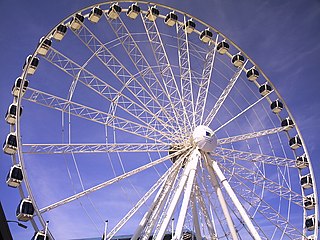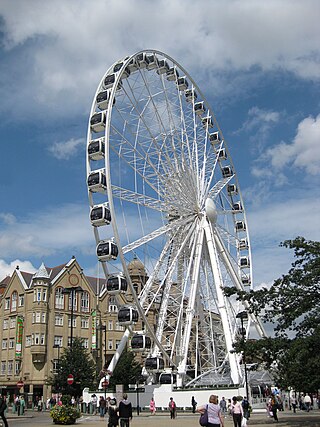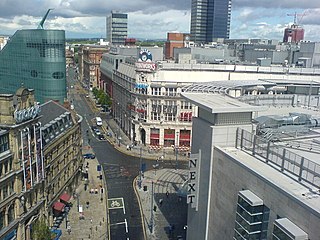
A Ferris wheel is an amusement ride consisting of a rotating upright wheel with multiple passenger-carrying components attached to the rim in such a way that as the wheel turns, they are kept upright, usually by gravity. Some of the largest modern Ferris wheels have cars mounted on the outside of the rim, with electric motors to independently rotate each car to keep it upright. These cars are often referred to as capsules or pods.

Manchester Piccadilly is the principal railway station in Manchester, England. Opened as Store Street in 1842, it was renamed Manchester London Road in 1847 and became Manchester Piccadilly in 1960. Located to the south-east of Manchester city centre, it hosts long-distance intercity and cross-country services to national destinations including London, Birmingham, Nottingham, Glasgow, Edinburgh, Cardiff, Bristol, Exeter, Plymouth, Reading, Southampton and Bournemouth; regional services to destinations in Northern England including Liverpool, Leeds, Sheffield, Newcastle and York; and local commuter services around Greater Manchester. It is one of 19 major stations managed by Network Rail. The station has 14 platforms: 12 terminal and two through platforms. Piccadilly is also a major interchange with the Metrolink light rail system with two tram platforms in its undercroft.

Manchester Metrolink is a tram/light rail system in Greater Manchester, England. The network has 99 stops along 64 miles (103 km) of standard-gauge route, making it the most extensive light rail system in the United Kingdom. Metrolink is owned by the public body Transport for Greater Manchester (TfGM) and operated and maintained under contract by a Keolis/Amey consortium. In 2021/22, 26 million passenger journeys were made on the system.

Manchester City Centre is the central business district of Manchester, England, within the confines of Great Ancoats Street, A6042 Trinity Way, and A57(M) Mancunian Way, which collectively form an inner ring road. The City Centre ward had a population of 17,861 at the 2011 census.

Piccadilly Gardens is a green space in Manchester city centre, England, on the edge of the Northern Quarter.

Exchange Square is a civic square in Manchester, England. The square was created after the 1996 Manchester bombing by the IRA. This reconstruction included the structural relocation of two pubs to make room for the new Marks & Spencer store.

Yorkshire Wheel was the name used by two transportable Ferris wheel installations at different locations in York, England.

Picc-Vic was a proposed, and later cancelled, underground railway designed in the early 1970s with the purpose of connecting two major mainline railway termini in Manchester city centre, England. The name Picc-Vic was a contraction of the two station names, Manchester Piccadilly and Manchester Victoria. The proposal envisaged the construction of an underground rail tunnel across Manchester city centre. The scheme was abandoned in 1977 during its proposal stages due to excessive costs, and that the scheme still retained two large and expensive-to-maintain terminal stations in Manchester; other similar sized cities had reduced their terminals to one.

The Wheel of Birmingham or Birmingham Wheel was a series of transportable Ferris wheel installations at Centenary Square in Birmingham, England. These have been landmarks in central Birmingham, visible from many parts of the city. The first opened on 6 November 2003, and its replacement opened on 21 October 2004, both being 60 metres (197 ft) tall.

Eye on Malaysia was a transportable Ferris wheel installation in Malaysia. It began operating in Kuala Lumpur in 2007, and was then moved to Malacca in 2008, where it operated until 2010.

The transport infrastructure of Greater Manchester is built up of numerous transport modes and forms an integral part of the structure of Greater Manchester and North West England – the most populated region outside of South East England which had approximately 301 million annual passenger journeys using either buses, planes, trains or trams in 2014. Its position as a national city of commerce, education and cultural importance means the city has one of the largest and most thorough transport infrastructures which is heavily relied upon by its 2.8 million inhabitants in the Greater Manchester conurbation and further afield in the North West region. Public transport comes under the jurisdiction of Transport for Greater Manchester.

The Wheel of Sheffield is a 60-metre (197 ft) tall transportable Ferris wheel installation on Fargate, by City Hall, in Sheffield, England. It first appeared from July 2009 until November 2010 and is now erected seasonally as a temporary structure.

The history of Manchester Metrolink begins with its conception as Greater Manchester's light rail system in 1982 by the Greater Manchester Passenger Transport Executive, and spans its inauguration in 1992 and the successive phases of expansion.

Corporation Street is a major thoroughfare in Manchester city centre, England. It runs from Dantzic Street to the junction of Cross Street and Market Street. Major buildings located on or adjacent to the street include the Arndale Centre, Exchange Square, The Printworks, Urbis and New Century House next to the CIS Tower.
Great City Attractions Limited, also known as Great City Attractions Global, was a company engaged in the operation of large transportable Ferris wheels. Based in Sutton Coldfield, UK, it was incorporated in 2008. It went into administration in July 2012 and ceased trading the following month.

The Brighton Wheel, also known during its planning and construction phase as the Brighton O and the Wheel of Excellence, was a transportable Ferris wheel installation which operated from October 2011 until May 2016 on the seafront in Brighton, part of the English city of Brighton and Hove. Situated below the East Cliff near Brighton Pier and built with private funding, its promoters anticipated that several hundred thousand visitors per year would experience the 12-minute ride. The wheel's location in a conservation area with many residential buildings proved controversial.
This timeline of Manchester Metrolink lists significant events in the history of Greater Manchester's light rail network.
Wheels Entertainments, sometimes referred to by the press as Wheels Entertainment, is a company engaged in the operation of large transportable Ferris wheels. Based at Shenstone, in Lichfield, Staffordshire, it is the UK operations arm of Dubai-based Freij Entertainment International.

Zone 1 of the Manchester Metrolink light rail network is the heart of the system where all of the other lines converge. Its boundaries are broadly equivalent to those of Manchester city centre, and approximately mirror the city's Inner Ring Road. Within Zone 1, first opened in 1992 as the City Zone, trams largely run along semi-pedestrianised streets rather than on their own separate alignment. The original route between the Altrincham and Bury lines ran to Victoria station via Market Street and High Street, and was soon joined by a branch to Piccadilly station by a three-way delta junction. A second route between the South-West and North-Eastern parts of the network was built to ease congestion on the original line. Opened in 2017, the Second City Crossing (2CC) added one additional stop to the network.


















